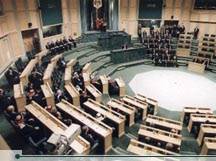 |
Keys
to the Kingdom National Anthem The Office Government |
Legislative powers are shared by the king and Parliament, which is comprised of the 40-member House of Notables (Majlis al-A'yan), or Senate, and the 80-member House of Deputies (Majlis al-Nuwwab). While senators are appointed by the King, deputies of the lower house are directly elected by universal suffrage. Article 34 of the Constitution entitles the king to dissolve either house of Parliament or to discharge any of its members. The normal parliamentary term is four years. |
 His Majesty King Hussein addressing Parliament. © Royal Hashemite Court Archives |
The process of lawmaking centers on Parliament. Both houses of Parliament initiate debates and vote on legislation. Proposals are referred by the prime minister to the House of Deputies, where deputies can either accept, amend or reject them. Each proposal is referred to a special committee in the Lower House for consideration. If the deputies accept the proposal, they refer it to the government to draft it in the form of a bill and submit it back to the House for approval. A bill approved by the House of Deputies is passed on by the House Speaker (an elected official) to the Senate for debate and a vote. If approved, the bill is then submitted to the king, who can either grant consent by royal decree or return the bill unapproved with justification for his refusal. In this case, the bill is returned to the House of Deputies, where the review and voting process is repeated. Should both houses, meeting jointly, pass the bill by a two-thirds majority, it becomes an Act of Parliament, constitutionally overriding the monarch’s veto. Any bill rejected by the Senate is returned to the House of Deputies for amendment. Disagreement between the two houses is settled by a two-thirds majority vote in a joint session of Parliament. Article 95 of the Constitution also empowers both the Senate and the House of Deputies to submit legislation to the government in the form of a draft law. Deputies in the lower house of Parliament are entitled to certain rights which the Constitution does not grant to upper house members. They are entitled to question the government on any public issue, and may make accusations against ministers through a decision issued by a two-thirds majority of lower house members. The government minister against whom accusations are made shall be suspended from his or her post until the case is resolved. The House of Deputies is also entitled to submit a vote of no-confidence in the government (the Council of Ministers or one of its members). If the House votes by an absolute majority to withhold confidence from the cabinet, then the cabinet must resign. The deputies can also withhold confidence from an individual minister, who must then resign. The Upper House of Parliament, or the Senate, is viewed as an extension of the king’s legislative powers because it is appointed by the king and enjoys his confidence. It enjoys equal status with the lower house on the level of legislation. Members of both houses enjoy the same complete freedom of expression when speaking in Parliament, and the same degree of immunity against arrest while in office. The Lower House alone, however, is entitled to hold a no-confidence vote against the government. Both houses of Parliament have several permanent committees, including: Legal, Financial, Administrative and Foreign Affairs. Members of Lower House of Parliament committees are elected for two years. Deputies and the Senate may also appoint other permanent or provisional committees and designate their functions and duties. |
 The Jordanian Parliament. © Lower House Archives |
|
In August 1993, Parliament passed “The Law Amending the Law of Election to the House of Deputies for the Year 1993” which adjusted Jordan’s electoral system to the principle of “one person, one vote.” The provisional law ended the previous voting system, whereby voters were entitled to as many votes as the number of parliamentary seats allocated for their district. This new law divides the country into 20 electoral constituencies, each with a certain allotment of seats in the Lower House of Parliament. In order to ensure adequate representation, Jordan also reserves a number of parliamentary seats for the country’s minorities. Of the 71 seats for Muslim deputies, six are reserved for Bedouins while three go to Circassians and Chechens. The remaining nine seats go to Christian deputies. |